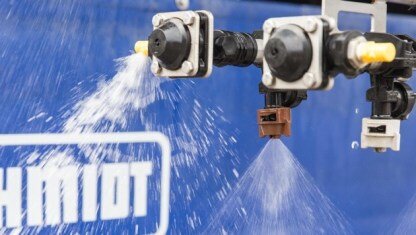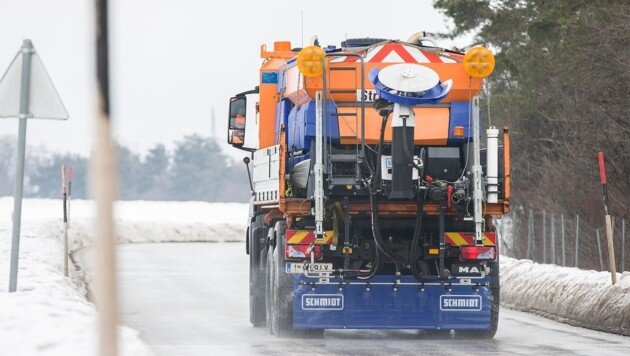For several years now, Tyrol’s roads have been cleared using pre-wetted salt. In the last record winter alone, 4000 tonnes of salt were saved. «Dry salt may be blown away to up to 60 per cent. This means that dry salt does not adhere to a dry road, hence is blown off the road by every draught of air,» explains Bernd Stigger, the responsible manager of the state. His team looked for alternatives – and found the brine. In the meantime, the county is using a mixture of dry salt and brine to combat ice and snow on many stretches of its road network.
Schmidt Combi Soliq WSP in action with pure brine
This year, Tyrol has gone one step further. At the maintenance depot, the Schmidt Combi Soliq WSP spreader was for the first time prepared to spray the roads with pure brine. «Our experience with pure brine is very good. The fear that it is not suitable at very low temperatures is unfounded. We tested it at temperatures of more than 10 degrees below zero. It is fully effective,» says Josef Schröder, summarising the findings.
The advantages of brine for Schröder and Stigger are obvious: less salt consumption, less environmental pollution. Josef Geisler, responsible for the county roads, also sees it this way: «Winter road clearance works at the highest level in Tyrol. Safety, efficiency and environmental protection are our goals. The brine spreading is a promising project, which we will continue and expand.»
Nonetheless the new method has its limits
In Vomp, the pure brine has already been tested under various conditions. 200 kilometres of roads between Innsbruck, Achental and Strass belong to the area of responsibility – a lot of stress tests can be carried out there. Based on his experience, Schröder assumes that the brine «works on three quarters of the national roads». However, liquid salt also has its limits. Schröder: «Dry salt is more suitable for heavy snowfall because it can absorb moisture.» Nevertheless, the brine vehicle does not have to remain in the garage. The driver can switch to dry salt at the push of a button.
Winter services on record course
Winter isn’t over yet. But already now it is clear that it is one of the busiest for the employees of the Tyrolean road maintenance companies. The heavy snowfalls in January have brought personnel and material to the limits of their resilience. «Our people have done a first-class job», underlines Josef Geisler. He assumes that the costs for winter services this year will be around 2 million Euros higher than in an average year. A look at the balance of the snowy previous winter shows how quickly salt consumption may rise. During the 2017/18 winter season, 36,500 tonnes of salt were used on the country’s roads.

